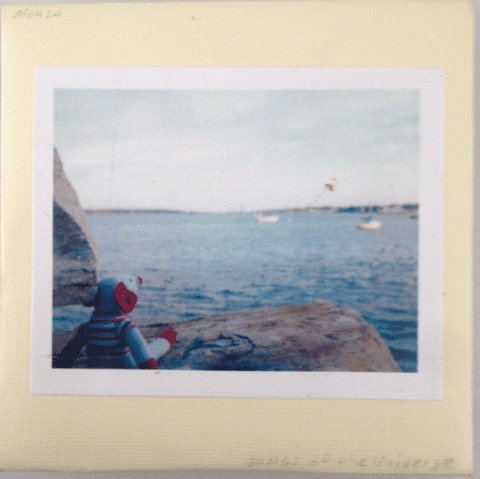 RARE BEAUTY Mousa’s Songs of the Universe is available as a limited-edition, lovingly packaged CD, or online.
|
Let’s get this out of the way: Mousa is the new recording alias of Vince Nez, a/k/a Aleric Nez, the name by which he released a nimble, unpredictable record in late 2010. To the extent that Songs of the Universe is a follow-up is debatable: the album’s nine songs are on a different plane than the hypnotic outsider blues-folk he was making then (which to this listener recalls John Frusciante’s famously eccentric 4-track solo effort Niandra Lades by, if nothing else, its instrumentation and refusal to submit to classifications).
As good as that first LP is, it’s essentially a recording of an interesting musician playing songs in a room. Not to endow the form with unnecessary piety, but Songs of the Universe, by contrast, is an album, and over its nine tracks, Nez conducts himself as a true fucking artist. He guides these songs over the illogical turns and intuitive leaps of an inveterately faithful poet, layering seemingly disconnected passages and intensities in search of broader, irresolvable threads. Because of this, Mousa songs are never safe — the structure of each one is threatened by the feeling that gave it life, which can appear as evocative sound events, odd measures, stylistic discord, and rhythmic irregularities. “Yer a Losin Battle” takes a page from Roy Orbison’s book and affixes it to an awkwardly minimal Casio beat. The schizophrenic, Southwestern lullaby “Laundrymatt Angel,” an ode both to the comforts of the local laundromat and a murderer lurking outside it, lets its serene measures lapse just long enough to mirror the song’s necessary tensions. And despite its attempts toward lyrical innocence, you’ll leave the mesmerizing “Belle of the Western Head” believing its one of the best paeans to mermaid sex you’ve ever heard.
Where Aleric Nez was a cloistered affair, Mousa finds the inspiration for Songs of the Universe in natural environments. He uses guitar, voice, keyboard, and various percussive programming to chart the atmosphere of each song before mining it for the wealth of emotional treasures it contains. “Lost Sailor” drifts in over a recording of ocean waves, its waltzing guitar chords swirling like a J. Mascis solo track as Vince guides his effortless falsetto between memory and resolve, offering more than one line as good as “the only thing left in this damning reality is to breathe her deep sailor, cuz you’re headed back out to sea.” He captures all the longing of an Arthur Russell bedroom recording without turning on the drum machine in “Patterson Pond,” a sense-diary of a youthful swim with numerous halting pauses containing as much energy as the words.
Yet it’s the album’s biggest leap that gets the biggest gains. I’ve don’t know precisely what makes “Birdy Song” so gratifying, but it’s one of the best tracks I’ve heard in forever, desperately fleshing out an intimate encounter over cerebral, turn-of-the-century indie-rock (think Shudder to Think, Pinback, those late Jeff Buckley tracks) stripped to its bare essentials; just melodic guitar and bare bones drum tracking. Yet despite its bedroom production values, this song too lives outside, constantly unfolding and expanding to cover the full acreage of its ten-and-a-half-minutes, not a second becoming tedious. It’s a high matched in spirit only by the album’s finale, “Aftermath,” an affectingly unapologetic torch song which seems committed to hit a high note to match every one of its mournful lows.